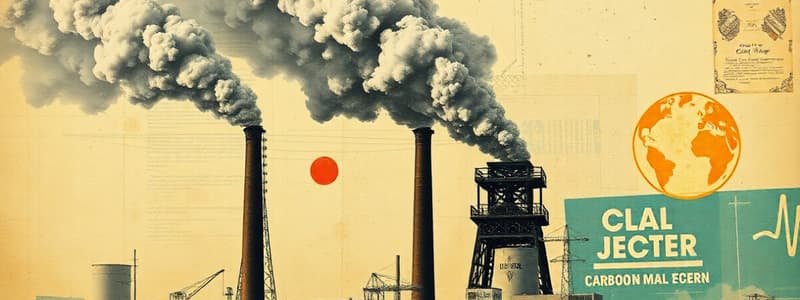Podcast
Questions and Answers
[Blank] gases trap heat in the atmosphere, contributing to global warming.
[Blank] gases trap heat in the atmosphere, contributing to global warming.
Greenhouse
The layer of ______ in the stratosphere absorbs harmful ultraviolet radiation from the sun.
The layer of ______ in the stratosphere absorbs harmful ultraviolet radiation from the sun.
ozone
[Blank] rain can damage ecosystems and infrastructure by acidifying soil and water bodies.
[Blank] rain can damage ecosystems and infrastructure by acidifying soil and water bodies.
Acid
Reducing our ______ footprint involves decreasing the amount of carbon dioxide and other greenhouse gases released into the atmosphere.
Reducing our ______ footprint involves decreasing the amount of carbon dioxide and other greenhouse gases released into the atmosphere.
[Blank] organic compounds are a major component of smog which contributes to respiratory problems.
[Blank] organic compounds are a major component of smog which contributes to respiratory problems.
Flashcards
Carbon-based fuels
Carbon-based fuels
Fuels containing carbon that release energy when burned. Examples include wood, coal, and natural gas.
Greenhouse gases (GHG)
Greenhouse gases (GHG)
Gases that trap heat in the Earth's atmosphere, contributing to global warming. Examples include carbon dioxide and methane.
Ozone (O3)
Ozone (O3)
A gas in the stratosphere that absorbs harmful ultraviolet (UV) radiation from the sun, protecting life on Earth.
Ultraviolet (UV) radiation
Ultraviolet (UV) radiation
Signup and view all the flashcards
Volatile organic compounds (VOC)
Volatile organic compounds (VOC)
Signup and view all the flashcards
Study Notes
- Carbon-based fuels and greenhouse gases are identified.
- The effects of ozone and ultraviolet radiation on the environment are explained.
- The health effects of air pollution and acid rain are described.
- Factors needed to reduce the carbon footprint are listed.
Carbon-Based Fuels
- Carbohydrates are a key type of carbon-based fuel.
- Smog contains carbon-based particles produced by burning fuels.
- Carbon is an element present in all organic compounds.
Greenhouse Gases (GHG)
- Greenhouse gases trap heat in the atmosphere, contributing to global warming.
Ozone
- Ozone affects our environment by absorbing harmful ultraviolet (UV) radiation in the stratosphere.
- Ozone-depleting substances (ODS) can damage the ozone layer.
Ultraviolet (UV) Radiation
- UV radiation impacts the environment, affecting living organisms and ecosystems.
- Irradiance is the measure of UV radiation.
Health Effects of Air Pollution
- Air pollution can have various negative impacts on human health, including respiratory and cardiovascular problems.
- Volatile organic compounds (VOCs) contribute to air pollution.
Health Effects of Acid Rain
- Acid rain can cause respiratory issues when its pollutants are inhaled.
Reducing Carbon Footprint
- Reducing the carbon footprint involves multiple factors, including lowering emissions and sequestration.
- Sequestration refers to the process of capturing and storing carbon dioxide from the atmosphere.
Studying That Suits You
Use AI to generate personalized quizzes and flashcards to suit your learning preferences.
Description
Explores carbon-based fuels, greenhouse gases, ozone and UV radiation effects. Describes the health impacts of air pollution and acid rain. Lists factors to reduce carbon footprint.



